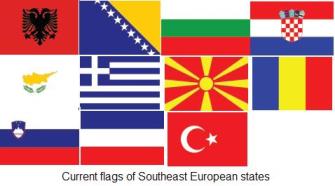|
|
A History Schoolbook to Learn Peace in the Balkans
an article by Kiki Chauvin, Paris
My attention was caught by an article by Irina Novakova, of
Sofia, published in the French journal "Courrier International",
because it presents an interesting initiative for the culture of peace.
It concerns a history schoolbook to learn peace in Balkans.
The usual history books in Albania, Serbia and Croatia do not
say the same thing as those in Greece or Turkey, because there are as
many versions of history as there are Balkan peoples. Today, if
everyone has their own version of the past, there is no idea on how to
live together in the present.
To go beyond these various versions of history and the hatred that they
can generate, sixteen historians present a schoolbook of history common
to the countries of the areas of Balkans. Rather than underlining the
divisions and particularities, they highlight what these peoples have
in common.

An illustration from one of the books
(click on photo to enlarge)
The project is being published by a non-governmental organization,
the Center for Democracy and Reconciliation in Southeast Europe
(CDRSEE). It is meant to serve as a history book of the Balkans for
secondary schools. Financed by the Stability Pact for South Eastern
Europe, it has just been presented to the European Parliament in
Brussels.
The authors of the book think that the teaching of the past is deformed
and incomplete, thus maintaining hatred and violence between the
peoples of the Balkans. They preferred to teach history from a point of
view that is comparative and multinational in scope. They think that a
schoolbook presenting a common and objective history of Balkans will
help the pupils to better understand the past by becoming aware than it
is necessary to learn how to live with it.
The project cannot escape the issue of nationalism. According to
Christina Koulouri, a co-author of the book, "history is a political
tool that every state uses to make itself look good. Today, what is
needed is that this tool serve the purposes of reconciliation and of a
common European future."
In the end, while learning about others, one learns much about oneself.
The handbook is being published in English, and six Balkan
languages (Greek, Serb, Croatian, Bosnian, Albanian and Macedonian) and
other editions in Bulgarian, Rumanian and Slovenien will appear soon.
The English version can be downloaded free from the CDRSEE website at http://cdsee.org/jhp/download_eng.html.
|
|







 |
DISCUSSION
Question(s) related to this article:
What is the best way to teach peace to children?
As a reader, you are invited to join in the discussion of this
article based on any of the above question(s): just click on the
question, read the previous comments and add a new reply. You may also
enter a new discussion topic on this article - see bottom of this page.
Thematic forum(s) in which this article is being discussed:
SCHOOLS AND PEACE EDUCATION
LATEST READER COMMENT:
Maria
Montessori believed that peace was innate within children. Her timeless
educational philosophy was developed around this basic understanding.
Perhaps all we need to do as teachers is to provide stimulating
learning environments that validate this knowing and understanding and
nurture it. We may not have to actually teach it, Sharing
peace-building stories gently attends to this. Strong, creative and
imaginative peace-building characters who focus upon win-win and have
faith in peace being possible are at the centre of the story plots. In
Hassaun Ali-Jones Bey's (Boundless Gratitude http://boundlessgratitude.com/products.html
) unique and mesmerising story, Black Ink is such a character who
bravely crosses the universe seeking validation of what he knows in his
heart.. . ...more.

|
|
|
This report was posted on April 6, 2008. The moderator is CPNN Administrator.
If you wish to start a new discussion topic on this article, please copy the title of this article which is A History Schoolbook to Learn Peace in the Balkans and its number which is 393 and enter this information along with your discussion question and a brief text on the new topic form.

A few stories are retained on the main listings if they are considered
by readers to be a priority. If you have not already done so, please
take the time to check a box below: should this article be considered
as a priority?

|





